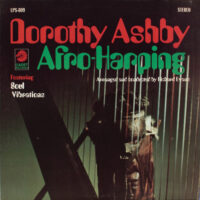
What are the odds that two of the greatest jazz harpists would hail from Detroit? Pretty damn small. But Alice McLeod (later Coltrane) and Dorothy Ashby did indeed come from the Motor City, and both helped to define this rarefied instrument, which, of course, heard more in classical-music concert halls than in jazz clubs. In another parallel between Ashby and Coltrane, both artists have gained much greater notoriety after their deaths than during their lifetimes. Better late than never, I guess…
Ashby established a modest rep in the 1950s and ’60s as an improvising, versatile harpist, playing with jazz luminaries such as Richard Davis, Jimmy Cobb, Ed Thigpen, and others, and releasing solid albums such as Hip Harp and In A Minor Groove. As the ’60s progressed, she began to move from bop to soul, funk, Middle Eastern, African, and Brazilian styles. The ’70s saw Ashby garner high-profile session dates with stars such as Stevie Wonder, Minnie Riperton, Billy Preston, and Bill Withers.
But it was Afro-Harping, recorded for the hip Chicago label Cadet, that really turned on folks—especially hip-hop producers and crate-diggers—to Ashby’s rich catalog… albeit posthumously (she passed away in 1986 at age 53). It’s frustrating that the LP bears no detailed credits, as the unidentified orchestra (conducted by Richard Evans, who also worked with Rotary Connection, Marlena Shaw, Ramsey Lewis, and Soulful Strings) and other instrumentalists are in phenomenal form here.
The record begins with the Evans-penned “Soul Vibrations,” one of the greatest opening tracks ever. Orchestral funk that swaggers with cool menace, the song’s lightened by Ashby’s pointillistically pretty harp plucks, like diamonds decorating an encroaching tank. This unique banger has dazzled up many a DJ set of mine. Not gonna lie: it’s surprising that “Soul Vibrations” only been sampled seven times, according to Whosampled.
After that early peak, things get a bit lighter in tone. “Games” is stealthy, oddly metered cha-cha that casts an utterly delightful spell, while “Action Line” peddles debonair, breezy samba-jazz in the Cal Tjader/Gary McFarland vein. The feathery and alluring “Theme From ‘Valley Of The Dolls'” (written by André and Dory Previn) and the Bacharach/David standard “The Look Of Love” prove that Ashby could thrive in a pop context. Ashby certainly put her delicately tantalizing stamp on the latter. And the way her serene harp flourishes interact with the aggressively bobbing bass line and trilling flute is breathtaking.
Those seeking high-quality funk should gravitate toward the title track, which was cowritten by Rotary Connection’s godly session guitarist/bassist Phil Upchurch. This groovy and swinging jam would segue well out of Ramsey Lewis’ “The ‘In’ Crowd.” Another funky nugget is “Come Live With Me,” whose languorous, seductive funk almost sounds like a precursor to trip-hop. Unsurprisingly, it’s been sampled over two dozen times.
If you dig Afro-Harping, you’ll likely also flip for Ashby’s less poppy and more global-music-savvy The Rubáiyát Of Dorothy Ashby (1970). You’re most likely to encounter the unofficial 2022 reissue of Afro-Harping on Audio Clarity and the 2018 reissue on Geffen. Fans may also be interested in this year’s 6xLP Ashby box set, With Strings Attached (1957-1965). Every era of Ashby’s truncated career has treasures to offer. -Buckley Mayfield
Located in Seattle’s Fremont neighborhood, Jive Time is always looking to buy your unwanted records (provided they are in good condition) or offer credit for trade. We also buy record collections.


